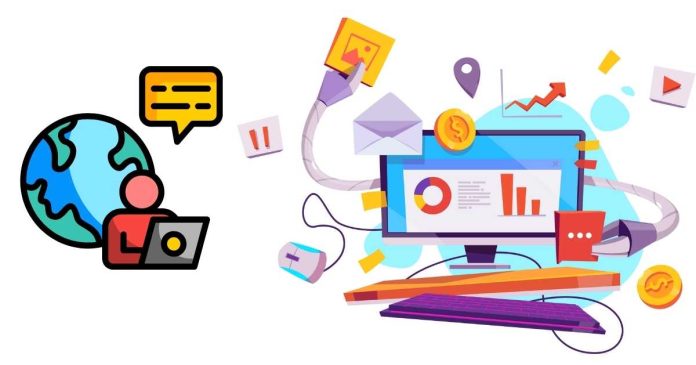Cloud computing has revolutionized how businesses, governments, and individuals interact with technology. Here are some real-world applications of cloud computing across various sectors:
1. Data Storage and Backup
- Example: Services like Google Drive, Dropbox, and iCloud offer scalable storage solutions that allow individuals and businesses to store, access, and share files from any device with internet access. They also provide backup and data recovery options to prevent data loss.
2. Software as a Service (SaaS)
- Example: Companies like Salesforce, Microsoft 365, and Zoom deliver software applications over the cloud. Users can access these tools via a web browser without the need for installing or maintaining software on their devices, significantly reducing costs and complexity.
3. Infrastructure as a Service (IaaS)
- Example: Amazon Web Services (AWS), Microsoft Azure, and Google Cloud provide IaaS solutions, offering businesses scalable virtual servers, storage, and networking. This enables organizations to quickly scale their IT infrastructure as demand grows, without needing to invest in physical hardware.
4. Platform as a Service (PaaS)
- Example: Platforms like Heroku, Google App Engine, and Microsoft Azure allow developers to build, test, and deploy applications without managing the underlying hardware or operating systems. These platforms offer pre-configured services, such as databases and analytics tools, which speed up the development process.
5. Cloud-Based Collaboration Tools
- Example: Google Workspace (Docs, Sheets, Slides), Microsoft 365 (Word, Excel, PowerPoint), and Slack facilitate real-time collaboration, allowing teams to work on documents, spreadsheets, and presentations together, no matter where they are located.
6. Big Data and Analytics
- Example: Cloud services like AWS Big Data, Google BigQuery, and Azure Analytics enable businesses to analyze large datasets without needing on-premises infrastructure. These tools help organizations with data mining, predictive analytics, and business intelligence.
7. Artificial Intelligence and Machine Learning
- Example: Cloud platforms such as AWS, Google Cloud AI, and Azure AI provide tools and services for businesses to integrate machine learning models, natural language processing, and AI functionalities into their applications, making it easier to develop advanced solutions without specialized hardware.
8. E-commerce Platforms
- Example: Shopify, WooCommerce, and Magento provide cloud-based solutions for building and running e-commerce stores. These platforms offer scalable infrastructure, payment processing, and inventory management tools, allowing businesses to focus on selling products rather than managing IT infrastructure.
9. Gaming
- Example: Cloud gaming platforms like Google Stadia, NVIDIA GeForce NOW, and Xbox Cloud Gaming allow users to play high-quality games on devices with lower processing power by streaming games from powerful cloud servers.
10. Healthcare and Telemedicine
- Example: Cloud-based healthcare platforms, such as Epic Systems and Cerner, enable doctors, hospitals, and clinics to store patient records, manage appointments, and offer telemedicine services. Cloud computing makes healthcare data more accessible, secure, and easily shared across systems.
11. Disaster Recovery and Business Continuity
- Example: Companies like Zerto, Acronis, and AWS provide cloud-based disaster recovery services. These solutions ensure that businesses can quickly recover their data and resume operations in case of a failure, significantly reducing downtime and data loss risks.
12. IoT (Internet of Things)
- Example: Cloud platforms like AWS IoT and Microsoft Azure IoT provide infrastructure for managing and analyzing the data generated by connected devices. This is crucial for industries like manufacturing, smart cities, and agriculture, where real-time monitoring and control of devices are essential.
13. Financial Services
- Example: Cloud platforms like Intuit QuickBooks, Xero, and Square allow businesses to manage finances, accounting, payments, and invoicing without relying on traditional desktop applications. Cloud-based financial services offer real-time insights and greater scalability.
14. Video Streaming and Content Delivery
- Example: Platforms like Netflix, YouTube, and Amazon Prime Video rely on cloud computing to store, process, and deliver massive amounts of video content to users around the world. The cloud enables efficient content delivery with low latency, even during peak demand.
15. Smart Cities and Urban Management
- Example: Cities are using cloud computing to manage traffic, utilities, and public safety. Solutions like IBM’s Smart City initiative integrate data from sensors and cameras, providing real-time insights and improving urban planning.
16. Supply Chain Management
- Example: Companies like Oracle and SAP offer cloud-based supply chain management tools. These platforms help businesses track inventory, manage procurement, and optimize logistics in real-time, improving efficiency and reducing costs.
17. Education and E-Learning
- Example: Learning management systems (LMS) such as Moodle and Blackboard, along with video conferencing tools like Zoom, enable remote education, content sharing, and collaboration between students and instructors across the globe.
18. Communication and Messaging
- Example: Cloud-based communication tools like WhatsApp, Telegram, and Microsoft Teams provide secure messaging, voice, and video calls, making it easy for individuals and businesses to stay connected.
In summary, cloud computing is transforming industries by providing scalable, flexible, and cost-effective solutions. It enables companies and individuals to access advanced technologies and capabilities without the need for significant upfront investment in hardware or infrastructure.


